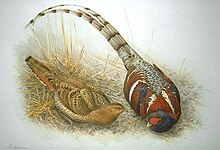Mrs. Hume's pheasant (Syrmaticus humiae) (Meitei: Nongin; literally, "one who follows the track of rain",[3][4][5] Mizo: Vavu), also known as Hume's pheasant or the bar-tailed pheasant, is a large, up to 90 cm (35 in) long, forest pheasant with a greyish brown head, bare red facial skin, chestnut brown plumage, yellowish bill, brownish orange iris, white wingbars and metallic blue neck feathers. The male has a long greyish white, barred black and brown tail. The female is a chestnut brown bird with whitish throat, buff color belly and white-tipped tail.
| Mrs. Hume's pheasant | |
|---|---|

| |
| Scientific classification | |
| Domain: | Eukaryota |
| Kingdom: | Animalia |
| Phylum: | Chordata |
| Class: | Aves |
| Order: | Galliformes |
| Family: | Phasianidae |
| Genus: | Syrmaticus |
| Species: | S. humiae
|
| Binomial name | |
| Syrmaticus humiae (Hume, 1881)
| |

| |
This rare and little known pheasant is found throughout forested habitats of the Mizoram, Patkai Range, Manipur, Yunnan and northern parts of Myanmar and Thailand. Its diet consists mainly of vegetation matter. The female lays three to twelve creamy white eggs in nests of leaves, twigs and feathers.

The name commemorates Mary Ann Grindall Hume, wife of the British naturalist in India Allan Octavian Hume. It is the state bird of Mizoram and Manipur.[6][7]
Owing to ongoing habitat loss, fragmented population and being hunted for food, the Mrs. Hume's pheasant is evaluated as Near Threatened on the IUCN Red List of Threatened Species. It is listed on Appendix I of CITES.
References
edit- ^ BirdLife International (2016). "Syrmaticus humiae". IUCN Red List of Threatened Species. 2016: e.T22679330A92810936. doi:10.2305/IUCN.UK.2016-3.RLTS.T22679330A92810936.en. Retrieved 12 November 2021.
- ^ "Appendices | CITES". cites.org. Retrieved 2022-01-14.
- ^ Kaushik, Alankar; Suchiang, Abir (2022-07-21). Narratives and New Voices from India: Cases of Community Development for Social Change. Springer Nature. p. 144. ISBN 978-981-19-2496-5.
- ^ "Nongin the State bird of Manipur By Sanasam Yaiphaba". e-pao.net. Retrieved 2022-07-25.
- ^ "StateBirdNongin". manenvis.nic.in.
- ^ "Murlen Naltional Park, Champhai District". Mizoram Tourism. Department of Tourism, Government of Mizoram. Retrieved 7 September 2020.
- ^ "Manipur initiative to conserve state bird Mrs Hume's Pheasant". Northeast Now. 5 April 2018. Retrieved 7 September 2020.
